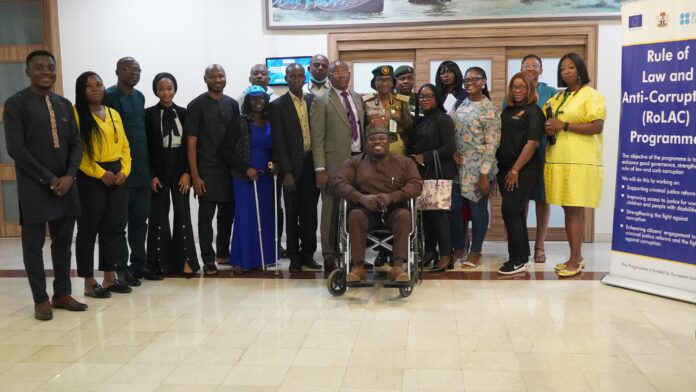The Albino Foundation (TAF) on Tuesday in Abuja led ROLAC Joint Session Towards Development of Disability Toolkits for Justice Service Providers in FCT.
The Founder and CEO of The Albino Foundation, Jake Epelle in his welcome remark said that the essence of the toolkits is for Justice Service Providers to understand what is expected them towards promoting disability inclusion through their activities.
“The toolkit is to mainstream disability inclusion in our various organizations, not only in terms of practice but also in terms of policy, organizations should develop policies bearing in mind the inclusiveness of persons with disabilities”.
“An environment that is not inclusive creates a lot of barriers for persons with disabilities because it limits their participation in the societal activities”.
The toolkit would be addressing the issues of access to court rooms, police stations, SGBV referral centres, correctional centres and also addressing communication gap between PWDs and access to justice services.
Olumide Olaniyan, a consultant who presented the toolkits developed in Lagos State, pointed out some of the key areas that the toolkit will be addressing such SGBV issues of Women with Disabilities, the use of right terminologies, provision of sign language interpretation at the Law enforcement agencies, production of materials in accessible format at the law enforcement agencies, ensuring access to physical structures of these law enforcement agencies etc.
In his presentation, he recommended that Law enforcement agencies’ facilities should be made accessible for persons with disabilities like the rest of the population with special dimensions considering the Corridors/Walkways, Toilets, ramps, lifts, emergency stairs, doors, floors, rails etc. He recommended that signage should be visible to persons with disabilities especially for the Persons with Albinism with universal symbols in contrast colour.
He equally stated that: “Access to justice for Persons With Disabilities: Key to protection of fundamental human rights of persons with disabilities, SGBV Responders and LEA need to mainstream disability into their plans, programmes and operations”
“Reduce discrimination against persons with disabilities in the justice sector and improves service delivery of these institutions and organizations”
“It can be achieved through participation, training, collaboration, continual disability assessment, inclusion of lessons learnt and integration of new inclusive ideas in disabilities”.
“Persons with disabilities are critical actors in this sectors and should play full role in participating, designing and adding their voice to issues as it concerns them.’Nothing about us, without us’.”
“Persons with disabilities are not liabilities or destitute and problem, Society and its institutions should remove the barriers, and persons with disabilities can live their full potentials”.
“The rest of the population need to join persons with disabilities to ensure human rights of all is protected and that access to justice is guaranteed.”
Earlier, The Executive Director, The Qualitative Magazine charged the justice service providers to mainstream disability inclusion in all their activities because access for persons with disabilities is access for all. Anyone can join disability community at any time and enhancing disability inclusion is to promote inclusive society. All-inclusive society will increase participation of persons with disabilities and subsequently increase productivity level of the society.
He also said that it is important for persons with disabilities to have access to justice service delivery because they are vulnerable to abuse and lack of access to justice on issues such as SGBV have further embolden the perpetrators towards sexual abuse of women with disabilities.
TQM learnt that the deliberations towards development of the toolkit for justice service providers in the FCT is still ongoing, there would be more meetings to adequately develop well-acceptable toolkit for stakeholders on justice sector.
Stakeholders represented at the meeting were Federal Ministry of Justice, Federal High Court, FCT High Court, FCT SGBV Referral Centre, Legal Aid Council, FIDA, Nigerians Correctional Service, Inclusive Friends Association, Cedar Seed Foundation, Centre for Ability, Rehabilitation and Empowerment (CARE), The Qualitative Magazine among others.


